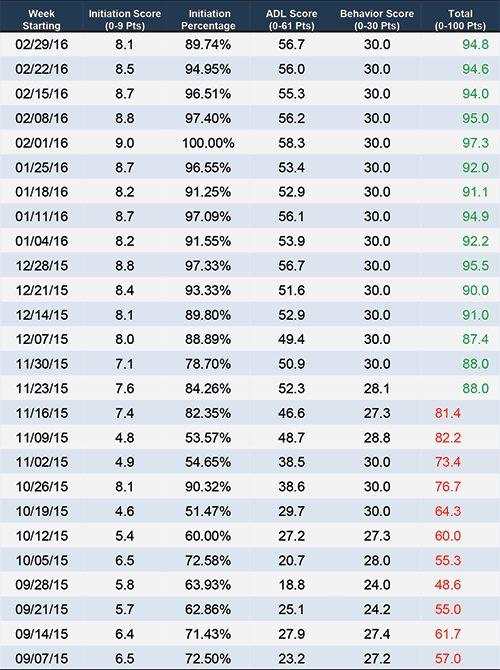At CNS, the goal for each of our patients is lifelong independence. Overcoming deficits and mastering life skills is the foundation of our treatment philosophy. The ILS is a powerful treatment tool that CNS uses to measure a patient’s skill level in core areas of capability. Below are some of the categories that are monitored.
Appropriate language, actions, and community interaction
Effective communication and behavior with the family
Noncompliance/avoidance
Sleep behavior and sleep routine
Following directions
Lack of initiation
Dressing
Hygiene and grooming
Toileting practices
Medication administration
Another key feature of the ILS is to collect quantifiable information on patient progress, which helps direct resources that may be required upon the patient’s return to life after injury. The ILS also helps clinicians, insurers, family members, and conservators to:
Follow progress and celebrate patient milestones
Track medication changes and shifts in behavior
Modify and customize the treatment plan based on patient progress and need
Substantiate the need for more services or therapy, either during rehabilitation or post discharge

The ILS and Rebuilding Capabilities
CNS is unique in the depth and detail of ILS tracking and its use in guiding treatment planning. The level of resource commitment required to record and measure patient progress is specific to CNS, as dedicated, trained staff are required to collect and synthesize data. This speaks to the level of care we provide and distinguishes CNS from many other providers.
The goal at CNS is to foster independence, greater autonomy, and self-sufficiency for all patients, and the ILS is crucial in reaching those objectives. As ILS data are recorded and analyzed, they are shared with the family to give an overview of progress, while helping them prepare for the future.
Since CNS’ inception in 1980, we have helped thousands of people overcome the challenges of traumatic brain injury. For us, family support is a priority on this journey of recovery and has been an essential part of our philosophy from the beginning.
The data in the chart above track a patient’s ILS scores over a 26-week period. Total ILS score progresses from an admission low of 57.0 to a discharge score of 94.8. Initiation percentage improved from 72.5% to 89.74%. Behavior improved from 27.2 to 30. Activities of daily living scores improved from 23.2 to 56.7.
CNS Monthly Newsletter
The latest CNS updates, including events, company information, and patient care developments
The Inside View
Quarterly magazine focused on brain injury research, rehabilitation, and advancements shaping the field
Sign-up for one or both to stay connected with brain injury news and recover